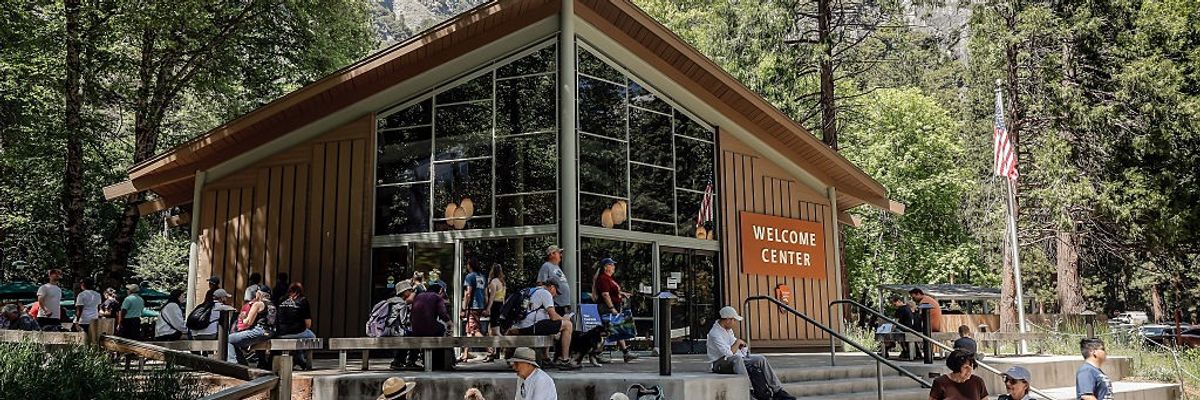
Visitors gather around the new Yosemite Valley Welcome Center near the Valley Store in Yosemite National Park, California, on Tuesday, May 20, 2025.
Yosemite National Park Employees Worked Without Pay for Weeks Amid Trump Cuts
"It's definitely taking advantage of people who love their jobs and don't want the park to suffer," said one park employee.
NPR on Monday published a lengthy investigation that found seasonal workers at Yosemite National Park this year worked for as long as six weeks without pay amid the chaos caused by the Trump administration's massive staffing cuts.
Multiple Yosemite workers told NPR that they felt exploited and added that they haven't received any backpay for the work they performed for free earlier this year.
"It's definitely taking advantage of people who love their jobs and don't want the park to suffer," said one park employee who worked without pay for three weeks before being formally hired.
As NPR explained, major national parks typically hire seasonal workers as extra help from May until October, which are the peak months for visitors. This year, however, actions by the Trump administration threw the parks' hiring routine into chaos and left human resources departments unsure of how many people they could afford to hire.
"On February 14, 10 full time federal employees at Yosemite were fired when the federal government terminated about 1,000 newly hired employees throughout the National Park Service," wrote NPR. "In the weeks that followed, additional experienced workers left the park service voluntarily. Since January, the amount of permanent staff across the service has declined by 24%, according to data analyzed in July by the National Parks Conservation Association, a nonprofit that defends parks."
As if that weren't chaotic enough, the government had to rehire many of the workers it had previously let go after realizing they were indispensable to keeping the parks operational.
"We had the firing of probationary employees in February and then the rehiring, and this was a huge, huge burden on human resources to try to get people in and out," Emily Thompson, executive director of the Coalition to Protect America's National Parks, told NPR.
One park employee told NPR that this led to nonstop turmoil for workers who were unsure when, if ever, they would receive a paycheck.
"My supervisors were emailing people week after week saying, 'Hey, the update is there's no updates and we understand you guys need housing and you're relying on this and we're relying on you. And we don't know what's going on, but one option is to volunteer,'" the worker explained.
As bad as things are at Yosemite, the situation is actually even worse at several smaller national parks that were not able to hire any kind of seasonal help this year. In fact, NPR pointed to data from the National Parks Conservation Association showing that "only about 4,500 of the people expected to fill 8,000 seasonal positions across the park service were working in seasonal roles."
A report released last month by the Center for American Progress (CAP) projected that the Trump administration's additional proposed cuts to national parks would dramatically worsen the experiences of visitors.
"In total, the proposed budget includes a nearly $4 billion cut to national parks, national forests, wildlife refuges, wilderness and recreation areas, and more," wrote CAP in its report. "That is a 35% decrease from 2024 funding and will impact services such as maintenance, research, land conservation and restoration, recreation, cultural and historic preservation, and visitor services."
The report also said that the cuts already enacted under the Department of Government Efficiency have resulted in "closed ranger stations at popular recreation areas, closed campgrounds in the Great Smoky Mountains, and closed access to public lakes and park toilets nationwide."
An Urgent Message From Our Co-Founder
Dear Common Dreams reader, The U.S. is on a fast track to authoritarianism like nothing I've ever seen. Meanwhile, corporate news outlets are utterly capitulating to Trump, twisting their coverage to avoid drawing his ire while lining up to stuff cash in his pockets. That's why I believe that Common Dreams is doing the best and most consequential reporting that we've ever done. Our small but mighty team is a progressive reporting powerhouse, covering the news every day that the corporate media never will. Our mission has always been simple: To inform. To inspire. And to ignite change for the common good. Now here's the key piece that I want all our readers to understand: None of this would be possible without your financial support. That's not just some fundraising cliche. It's the absolute and literal truth. We don't accept corporate advertising and never will. We don't have a paywall because we don't think people should be blocked from critical news based on their ability to pay. Everything we do is funded by the donations of readers like you. Will you donate now to help power the nonprofit, independent reporting of Common Dreams? Thank you for being a vital member of our community. Together, we can keep independent journalism alive when it’s needed most. - Craig Brown, Co-founder |
NPR on Monday published a lengthy investigation that found seasonal workers at Yosemite National Park this year worked for as long as six weeks without pay amid the chaos caused by the Trump administration's massive staffing cuts.
Multiple Yosemite workers told NPR that they felt exploited and added that they haven't received any backpay for the work they performed for free earlier this year.
"It's definitely taking advantage of people who love their jobs and don't want the park to suffer," said one park employee who worked without pay for three weeks before being formally hired.
As NPR explained, major national parks typically hire seasonal workers as extra help from May until October, which are the peak months for visitors. This year, however, actions by the Trump administration threw the parks' hiring routine into chaos and left human resources departments unsure of how many people they could afford to hire.
"On February 14, 10 full time federal employees at Yosemite were fired when the federal government terminated about 1,000 newly hired employees throughout the National Park Service," wrote NPR. "In the weeks that followed, additional experienced workers left the park service voluntarily. Since January, the amount of permanent staff across the service has declined by 24%, according to data analyzed in July by the National Parks Conservation Association, a nonprofit that defends parks."
As if that weren't chaotic enough, the government had to rehire many of the workers it had previously let go after realizing they were indispensable to keeping the parks operational.
"We had the firing of probationary employees in February and then the rehiring, and this was a huge, huge burden on human resources to try to get people in and out," Emily Thompson, executive director of the Coalition to Protect America's National Parks, told NPR.
One park employee told NPR that this led to nonstop turmoil for workers who were unsure when, if ever, they would receive a paycheck.
"My supervisors were emailing people week after week saying, 'Hey, the update is there's no updates and we understand you guys need housing and you're relying on this and we're relying on you. And we don't know what's going on, but one option is to volunteer,'" the worker explained.
As bad as things are at Yosemite, the situation is actually even worse at several smaller national parks that were not able to hire any kind of seasonal help this year. In fact, NPR pointed to data from the National Parks Conservation Association showing that "only about 4,500 of the people expected to fill 8,000 seasonal positions across the park service were working in seasonal roles."
A report released last month by the Center for American Progress (CAP) projected that the Trump administration's additional proposed cuts to national parks would dramatically worsen the experiences of visitors.
"In total, the proposed budget includes a nearly $4 billion cut to national parks, national forests, wildlife refuges, wilderness and recreation areas, and more," wrote CAP in its report. "That is a 35% decrease from 2024 funding and will impact services such as maintenance, research, land conservation and restoration, recreation, cultural and historic preservation, and visitor services."
The report also said that the cuts already enacted under the Department of Government Efficiency have resulted in "closed ranger stations at popular recreation areas, closed campgrounds in the Great Smoky Mountains, and closed access to public lakes and park toilets nationwide."
- Musk Might Be Gone, But Watchdogs Warn Trump/DOGE Carnage Will Continue ›
- As Flood Deaths Rise, Texas Officials Blast Faulty Forecast by DOGE-Gutted National Weather Service ›
- DOGE Wasted Tens of Billions While Chainsawing the Government in the Name of 'Efficiency': Senate Report ›
NPR on Monday published a lengthy investigation that found seasonal workers at Yosemite National Park this year worked for as long as six weeks without pay amid the chaos caused by the Trump administration's massive staffing cuts.
Multiple Yosemite workers told NPR that they felt exploited and added that they haven't received any backpay for the work they performed for free earlier this year.
"It's definitely taking advantage of people who love their jobs and don't want the park to suffer," said one park employee who worked without pay for three weeks before being formally hired.
As NPR explained, major national parks typically hire seasonal workers as extra help from May until October, which are the peak months for visitors. This year, however, actions by the Trump administration threw the parks' hiring routine into chaos and left human resources departments unsure of how many people they could afford to hire.
"On February 14, 10 full time federal employees at Yosemite were fired when the federal government terminated about 1,000 newly hired employees throughout the National Park Service," wrote NPR. "In the weeks that followed, additional experienced workers left the park service voluntarily. Since January, the amount of permanent staff across the service has declined by 24%, according to data analyzed in July by the National Parks Conservation Association, a nonprofit that defends parks."
As if that weren't chaotic enough, the government had to rehire many of the workers it had previously let go after realizing they were indispensable to keeping the parks operational.
"We had the firing of probationary employees in February and then the rehiring, and this was a huge, huge burden on human resources to try to get people in and out," Emily Thompson, executive director of the Coalition to Protect America's National Parks, told NPR.
One park employee told NPR that this led to nonstop turmoil for workers who were unsure when, if ever, they would receive a paycheck.
"My supervisors were emailing people week after week saying, 'Hey, the update is there's no updates and we understand you guys need housing and you're relying on this and we're relying on you. And we don't know what's going on, but one option is to volunteer,'" the worker explained.
As bad as things are at Yosemite, the situation is actually even worse at several smaller national parks that were not able to hire any kind of seasonal help this year. In fact, NPR pointed to data from the National Parks Conservation Association showing that "only about 4,500 of the people expected to fill 8,000 seasonal positions across the park service were working in seasonal roles."
A report released last month by the Center for American Progress (CAP) projected that the Trump administration's additional proposed cuts to national parks would dramatically worsen the experiences of visitors.
"In total, the proposed budget includes a nearly $4 billion cut to national parks, national forests, wildlife refuges, wilderness and recreation areas, and more," wrote CAP in its report. "That is a 35% decrease from 2024 funding and will impact services such as maintenance, research, land conservation and restoration, recreation, cultural and historic preservation, and visitor services."
The report also said that the cuts already enacted under the Department of Government Efficiency have resulted in "closed ranger stations at popular recreation areas, closed campgrounds in the Great Smoky Mountains, and closed access to public lakes and park toilets nationwide."
- Musk Might Be Gone, But Watchdogs Warn Trump/DOGE Carnage Will Continue ›
- As Flood Deaths Rise, Texas Officials Blast Faulty Forecast by DOGE-Gutted National Weather Service ›
- DOGE Wasted Tens of Billions While Chainsawing the Government in the Name of 'Efficiency': Senate Report ›

